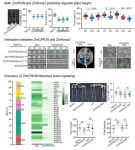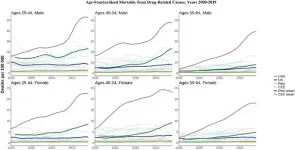(Press-News.org) The worry of gaining weight is a common excuse for smokers not to quit. A new study published today in the scientific journal Addiction has found that both starting smoking and lifetime smoking may increase abdominal fat, especially visceral fat: the unhealthy fat deep inside the abdomen that is linked to a higher risk of heart disease, diabetes, stroke, and dementia.
Smokers tend to have lower body weights than non-smokers, but they also have more abdominal fat, and more abdominal visceral fat. Visceral fat is hard to see; you can have a flat stomach and still have unhealthy amounts of it, raising your risk of serious illness. This new study offers supportive evidence that smoking may cause that type of fat to increase.
Researchers at the NNF Center for Basic Metabolic Research, University of Copenhagen used a form of statistical analysis called Mendelian randomization (MR) to determine whether smoking causes an increase in abdominal fat. MR combines the results from different genetic studies to look for causal relationships between an exposure (in this case, smoking) and outcome (increased abdominal fat). This new study combined multiple genetic results from European ancestry studies of smoking exposures and measures of body fat distribution (e.g., waist-hip ratio and waist and hip circumferences).
First, the researchers used previous genetic studies to identify which genes are linked to smoking habits and body fat distribution. Second, they used this genetic information to determine whether people with genes associated with smoking tend to have different body fat distributions. Finally, they accounted for other influences, such as alcohol consumption or socioeconomic background, to ensure that any connections they found between smoking and body fat distribution were truly due to smoking itself and not other factors.
Lead author Dr. Germán D. Carrasquilla explains: “This study found that starting to smoke and smoking over a lifetime might cause an increase in belly fat, as seen by measurements of waist-to-hip ratio. In a further analysis, we also found that the type of fat that increases is more likely the visceral fat, rather than the fat just under the skin.”
“Previous studies have been prone to confounding, which happens when an independent variable affects the results. Because our study design uses genetic variations, it does a better job of reducing or controlling for those variables. The influence of smoking on belly fat seems to happen regardless of other factors such as socioeconomic status, alcohol use, ADHD, or how much of a risk-taker someone is.”
“From a public health point of view, these findings reinforce the importance of large-scale efforts to prevent and reduce smoking in the general population, as this may also help to reduce abdominal visceral fat and all the chronic diseases that are related to it. Reducing one major health risk in the population will, indirectly, reduce another major health risk.”
The researchers determined that excess abdominal fat in smokers was predominantly visceral fat by studying how DNA variants linked to smoking habits and belly fat relate to fat compartments in different parts of the body. The key finding is that these genetic factors are more strongly linked to increased visceral adipose tissue—the deep fat that wraps around the abdominal organs—than to subcutaneous fat that is stored under the skin.
The two underlying European ancestry studies were large in scale: the smoking study looked at 1.2 million people who started smoking and over 450,000 lifetime smokers, and the body fat distribution study included over 600,000 people.
-- Ends –
For editors:
This paper is available online after the embargo has lifted ( https://onlinelibrary.wiley.com/doi/10.1111/add.16454), or you may request a copy from Jean O’Reilly, Editorial Manager, Addiction, jean@addictionjournal.org.
To speak with lead author Dr. Germán D. Carrasquilla, please contact him at the University of Copenhagen by work telephone (+45 35 33 45 95), or email (german.carrasquilla@sund.ku.dk).
To speak with Dr. Tuomas O. Kilpeläinen, please contact him at the University of Copenhagen by work telephone (+45 35 33 22 47), or email (tuomas.kilpelainen@sund.ku.dk).
Full citation for article: Carrasquilla GD, García-Ureña M, Romero-Lado MJ, and Kilpeläinen TO. Estimating causality between smoking and abdominal obesity by Mendelian randomization. Addiction. 2024. DOI: 10.1111/add.16454
Primary funding: The Novo Nordisk Foundation, the European Union’s Horizon 2020 program, and the Danish Diabetes Academy (DDA).
Declaration of interests: None.
Further information on Mendelian randomisation:
https://www.youtube.com/watch?v=LoTgfGotaQ4&ab_channel=TARGBristol
Addiction is a monthly international scientific journal publishing peer-reviewed research reports on alcohol, substances, tobacco, gambling, editorials, and other debate pieces. Owned by the Society for the Study of Addiction, it has been in continuous publication since 1884.
END
The irony of smoking to stay thin: smoking increases belly fat
2024-03-21
ELSE PRESS RELEASES FROM THIS DATE:
Healing eyes with contact lenses
2024-03-21
A cross-disciplinary University of Waterloo team has developed a new contact lens material that could act as a bandage for corneal wounds while releasing drugs in a controlled manner to help the eye heal faster.
Typically, corneal abrasion patients spend seven to 10 days wearing a clear, oxygen-permeable bandage contact lens, often instilled with eyedrops containing antibiotics. However, the one-time antibiotic application makes it difficult to ensure enough drugs stay on the eye for sustained treatment.
“It’s a targeted-release drug delivery ...
Excess temperatures cause low flocking concerns
2024-03-21
High temperatures during critical periods of the reproductive cycle of sheep result in 2.1 million fewer lambs produced in Australia each year, costing sheep farmers an estimated $97 million annually.
The work, funded by Meat and Livestock Australia and conducted by a transdisciplinary team of researchers from the University of Adelaide and South Australian Research Development Institute (SARDI), found that days above 32°C during the week of mating caused the significant loss of potential lambs.
Published in Nature Food, the study found annual losses of potential lambs would increase to 2.5 million if median global warming increased ...
The maize ZmCPK39-ZmKnox2 module regulates plant height
2024-03-21
This study was led by Professor Mingliang Xu (College of Agronomy and Biotechnology, China Agricultural University, Beijing, China). Through phylogenic analysis, the authors identified a gene encoding a calcium-dependent protein kinase, ZmCPK39, as a candidate gene for plant height regulation in maize. The function of ZmCPK39 in controlling plant height has been verified using gene editing technology. Compared to the wild-type ND101, knockout of ZmCPK39 significantly reduced plant height by 40%.
The authors further ...
New route to recyclable polymers from plants
2024-03-21
Cellulose, abundantly available from plant biomass, can be converted into molecules used to make a new class of recyclable polymers, to sustainably replace some plastics.
Researchers at Hokkaido University have taken a significant step forward in the drive to make recyclable yet stable plastics from plant materials. This is a key requirement to reduce the burden of plastic pollution in the environment. They developed a convenient and versatile method to make a variety of polymers from chemicals derived from plant cellulose; crucially, these polymers can be fully recycled. The method was published in the journal ACS Macro Letters.
Cellulose is one of the most abundant ...
Revolutionizing gastric cancer treatment through personalized 3D bioprinting
2024-03-21
Gastric cancer ranks among the most widespread diseases in Asian populations, with South Koreans experiencing the third-highest incidence globally in 2020, as reported by the International Agency for Research on Cancer. Recently, a collaborative research effort between Pohang University of Science and Technology (POSTECH) and Yonsei University achieved advancement in the realm of precision personalized medicine for gastric cancer. By using 3D bioprinting to accurately replicate the biological environment surrounding gastric cancer cells, the researchers have achieved a significant ...
How neural inhibition could reduce alcohol use
2024-03-21
LA JOLLA, CA—Neuroscientists at Scripps Research have found that inhibiting neurons involved in the body’s stress response may reduce alcohol consumption in people who have both post-traumatic stress disorder (PTSD) and alcohol use disorder (AUD)—even if they still experience trauma-related anxiety.
The findings were published March 21 in Molecular Psychiatry. These discoveries are helping untangle the complex role that stress and trauma play in neurological disorders like PTSD and AUD, while also informing the development of new treatment options for people who experience both these conditions simultaneously.
“Traumatic ...
The Lancet: Dramatic declines in global fertility rates set to transform global population patterns by 2100
2024-03-21
Embargoed access to the paper and contact details for authors are available in Notes to Editors at the end of the release.
By 2050, over three-quarters (155 of 204) of countries will not have high enough fertility rates to sustain population size over time; this will increase to 97% of countries (198 of 204) by 2100.
Pronounced shifts in patterns of livebirths are also predicted, with the share of the world’s live births nearly doubling in low-income regions from 18% in 2021 to 35% in 2100; and sub-Saharan Africa accounting for one in every two children born on the planet by 2100.
In low-income settings with higher fertility rates, better access to contraceptives and female education ...
NHS needs 32 billion cash injection to recover shortfall and help tackle current crisis
2024-03-21
The NHS needs an immediate cash injection of around £8.5bn a year over the next four years to make up a £32bn shortfall in funding and help tackle the current crisis, especially in areas such as waiting times, access to primary care, workforce and capital investment, say experts in the second report of The BMJ Commission on the Future of the NHS.
John Appleby and colleagues argue that, while the government’s recent spring budget funding pledges are a start, they “certainly will not make up the significant shortfall that the NHS ...
Many publicly accessible AI assistants lack adequate safeguards to prevent mass health disinformation
2024-03-21
Effective processes for reporting and responding to safeguard vulnerabilities are also lacking, warn experts
Many publicly accessible artificial intelligence (AI) assistants lack adequate safeguards to consistently prevent the mass generation of health disinformation across a broad range of topics, warn experts in The BMJ today.
They call for enhanced regulation, transparency, and routine auditing to help prevent advanced AI assistants from contributing to the generation of health disinformation.
Large language models (LLMs) are a form of generative AI that have the potential to greatly improve many aspects of society, including ...
New study highlights troubling trends in midlife mortality in the US and UK
2024-03-21
A new study by researchers at the Leverhulme Centre for Demographic Science (LCDS) and Princeton University reveals that US working-age adults are dying at higher rates than their peers in high-income countries; the UK is also falling behind. The study is published today in the International Journal of Epidemiology.
Using annual mortality data from the World Health Organization Mortality Database, the study compared trends in midlife mortality for adults aged 25-64 years between 1990 and 2019 across 15 major causes of death in 18 high-income countries, ...




